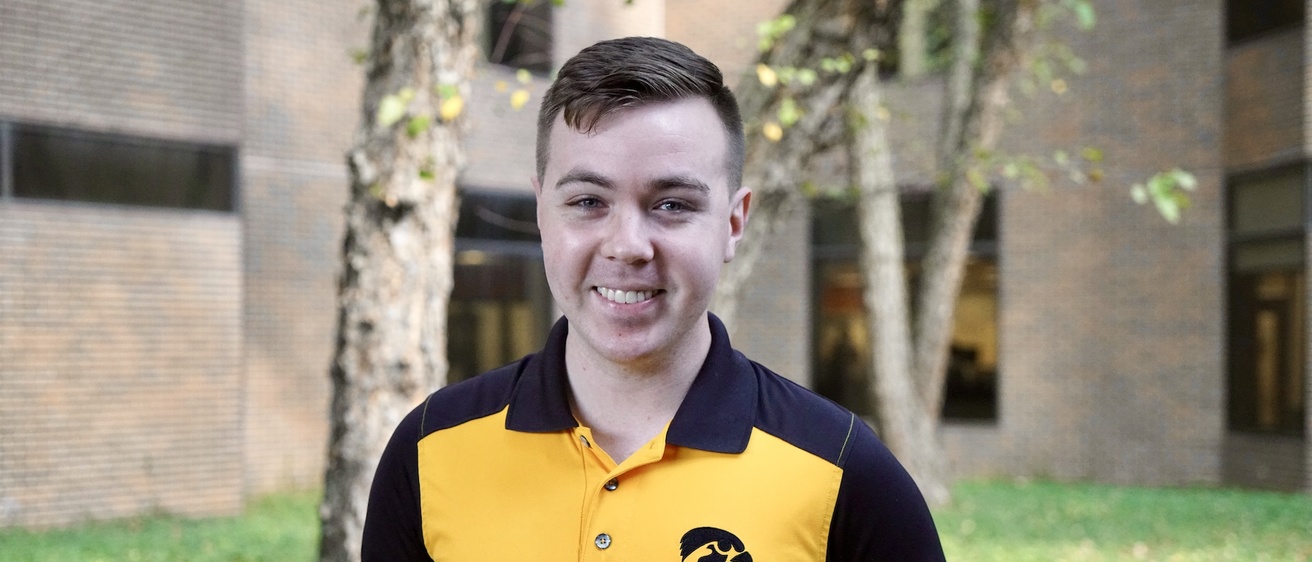Matthew Hayes originally thought he wanted to be a band director after observing the meaningful relationships directors often have with their students throughout his years as a band student in the Moline School District in Moline, Illinois.
Hayes graduated from the University of Iowa with bachelor’s degrees in music education and percussion performance in the spring of 2021.
However, as he completed his bachelor’s degrees, Hayes discovered his true passion is in understanding how to help students learn and thrive academically, emotionally, behaviorally and psychologically. This prompted him to return to the College of Education and pursue a doctoral degree in the newly-revitalized School Psychology program.
While pursuing a doctoral degree, Hayes also serves as the Veteran Resource Specialist for the College of Education’s supportive community for military connected individuals, I-SERVE (Iowa Supports Education and Resources for Veterans and Enlisted).
While he knows he could have had a great impact as a teacher, he determined he was more interested in doing so as a licensed mental health practitioner. Hayes wants to support teachers as they teach curriculum, rather than teaching the curriculum directly.
“I wanted to be able to go further,” Hayes says. “I wanted to be the person students get referred to rather than being the one that could be their sounding board and refer them to other people.”
When he discovered the field of school psychology, which he describes as the intersection of psychological services and school, he decided it would be a good fit.
Now, Hayes is looking forward to growing with the new School Psychology program at Iowa as it is rebuilt.
“We’re working with excited professors and people who are excited to get the program up and running again,” Hayes says.
Hayes is looking forward to one day working with youth to make a treatment plan and collaborating with teachers to develop strong relationships with their students.
While he works toward his degree, Hayes is finding fulfillment in his position at I-SERVE, which helps veterans, enlisted and military connected individuals transition into higher education at the College of Education.
There are currently 138 veterans and military-connected (VMC) individuals in the College of Education. This includes active members, veterans and military-connected spouses or family-members.
Hayes enlisted in the Air National Guard in 2015 and went to Basic Training in 2016. Once he came back to school, he experienced a rough transition. While he was struggling, he got involved with the campus wide veteran resource group, IVETS, which helped him turn things around at Iowa during his undergraduate career.
“My first semester back was really, really rough academically, emotionally and socially,” Hayes says. “When I came back, I had to start over again… getting involved with the veterans on campus and within the College of Education was the thing that really kept me going, and I think that’s the reason I was successful in my undergrad.”
Hayes wants to offer that same support for other students, since transitioning from the military to university life can be an isolating experience. He says that military connected individuals in college are often at a different point in their lives than traditional students, and they might not fit the mold of a “typical” undergraduate student.
That’s why he chose this role to work directly with VMC students to act as an extra layer of support. As the Veteran Resource Specialist, he can answer questions and point students to helpful resources, understanding what they are going through because of his own experiences.
Hayes wants I-SERVE to be a place where VMC students can come and let down their guard and speak with others who understand military language and experiences.
“You can be around people that understand what you’ve been through and understand the experiences you’ve had,” Hayes says.
Hayes also works in advocacy and community outreach in his role, helping future educators and clinicians understand the unique factors they might see in students with military involved families.
It’s important to Hayes to help chip away at military stereotypes and show that there is great diversity within this population
“There is no one image of what a veteran is that we are supposed to fit into or that we do fit into,” Hayes says. “Letting people see that we are regular people who sometimes face unique challenges is good.”
Hayes says when people think of military members, they often think of ultra macho and athletic men, but he wants people to know this is not always the case.
“We are short, we are tall, we are beefy, we are scrawny, we are straight, gay, men, women, all sorts of things,” Hayes says. “Being able to show that there is a diverse group of people that make up the veteran population, veteran community, and even beyond that is important.”
When it comes to recruitment, Hayes believes VMC students bring unique skill sets to the table that can benefit both themselves, their community, and their clients or students.
“I’m a strong believer that military members would make awesome additions to all of the degree programs the College of Education offers,” Hayes says.
If Hayes could tell VMC individuals at Iowa one thing, he would encourage them to find their group.
“Your group doesn’t have to be military members or people within your program in your college, but find your group,” Hayes says.
Of course, if you are still looking for a group, Hayes says the veteran community on campus is a great place to start.
